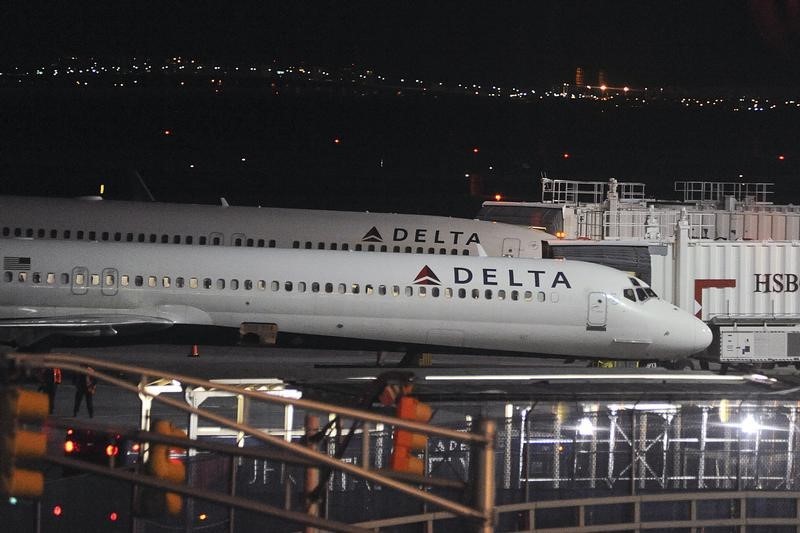ATLANTA, GA - Delta Air Lines, Inc. (NYSE:DAL) held its Annual Meeting of Shareholders on Wednesday, where a series of proposals were brought before the company's shareholders for voting. According to the 8-K filing submitted to the Securities and Exchange Commission today, five key matters were decided upon during the meeting.
The first item on the agenda was the election of the company's Board of Directors. Shareholders re-elected all twelve director nominees to serve until the next annual meeting or until their successors are duly elected and qualified. Edward H. Bastian, Maria Black, Willie CW Chiang, and the other nominees received a majority of votes cast in favor, with the number of votes against and abstentions varying per director.
Additionally, the shareholders approved the advisory vote on executive compensation, indicating support for the company's approach to remunerating its executives. The respective votes for and against were 315,755,402 and 117,643,089, with 6,690,477 abstentions.
The appointment of Ernst & Young LLP as the company's independent auditors for the fiscal year 2024 was ratified with an overwhelming majority of 534,382,369 votes in favor, compared to 4,347,513 against and 879,059 abstentions.
Two shareholder proposals were also considered. The first, a request for reporting on third-party political contributions, did not pass, garnering 15,683,184 votes for and 411,090,147 votes against, with 13,315,637 abstentions. The second proposal, requesting the adoption of a non-interference policy, was also not approved, with 110,780,916 votes for, 321,514,451 against, and 7,793,601 abstentions.
Delta Air Lines' management team and board members have been authorized to continue their stewardship of the company for another year following the approval of these measures. The results reflect the shareholders' trust in the current leadership and strategic direction of the airline.
In other recent news, Delta Air Lines has been in the spotlight with several noteworthy developments. The company's Q1 2024 earnings per share surpassed estimates, coming in at $0.45, and the firm expects a 5-7% year-over-year revenue increase in Q2. Delta's strategic partnership with American Express (NYSE:AXP) and its loyalty program are anticipated to drive significant high-margin revenue growth. Several financial institutions have given the airline a favorable outlook, including HSBC Global Research, Argus Research, Evercore ISI, Barclays (LON:BARC), Susquehanna Financial Group, and UBS Securities, which have all initiated or maintained buy and overweight ratings on the stock.
Additionally, the U.S. Treasury Department is planning to auction warrants to buy shares in various U.S. airlines, including Delta, aiming to gather a minimum of $492 million. The Treasury has set the price for Delta Air Lines warrants at $221 million. The warrants were obtained as part of the conditions for COVID-19 relief aid given to the airlines.
Delta, along with other major U.S. airlines, is also urging the government to address a chronic shortage of air traffic controllers as the summer travel season approaches. They have also challenged the U.S. Department of Transportation over a regulation that mandates the upfront display of various airline fees, arguing that the rule could lead to consumer confusion. These recent developments highlight the dynamic nature of the airline industry and the various factors impacting Delta's operations and strategic decisions.
InvestingPro Insights
As Delta Air Lines (NYSE:DAL) solidifies its leadership and strategic direction with the support of its shareholders, the company's financial health and market performance remain critical for investors. According to InvestingPro, Delta boasts a high shareholder yield and is currently trading at a low earnings multiple, with a P/E Ratio of 6.3. This could be indicative of the stock being undervalued compared to its earnings potential. The airline's prominence in the Passenger Airlines industry is bolstered by its performance over the last twelve months, where it remained profitable with a robust revenue growth of 9.34%.
InvestingPro data also highlights that Delta's adjusted market capitalization stands at $31.9 billion, with a revenue of $59.04 billion for the last twelve months as of Q1 2024. However, it's important for investors to note that the company's short-term obligations exceed its liquid assets, which could present liquidity challenges. Despite this, analysts predict profitability for the company this year, which is supported by a strong gross profit margin of 22.22% and an operating income margin of 10.38%.
For those looking to delve deeper into Delta's financials and future prospects, there are additional InvestingPro Tips available, offering comprehensive analyses and forecasts. By using the coupon code PRONEWS24, readers can get an additional 10% off a yearly or biyearly Pro and Pro+ subscription, unlocking even more valuable insights to inform their investment decisions.
This article was generated with the support of AI and reviewed by an editor. For more information see our T&C.
